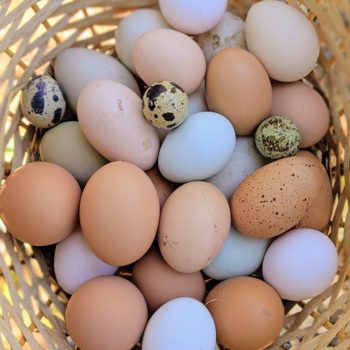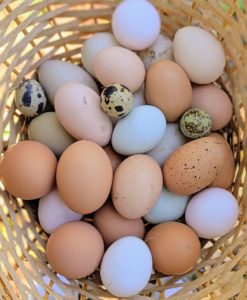Eggs hold the number one spot on the biological value (how readily a digested protein can be used in protein synthesis in the cells of the organism) scale. Along with other nutrients, they’re a great source of choline which plays roles in fat transport and metabolism, muscle movement, memory, neurotransmission, DNA synthesis and cell structure and messaging.
With all three varieties of eggs more available these days the nutritional differences between them, including their costs may impact your decision about which to choose for your own dog.
Comparing one type of egg to another is best done by weight because duck eggs are larger than chicken eggs, and quail eggs are very much smaller.
On average, one large chicken egg weighs about 50 grams; duck egg 70 grams, quail egg 9 grams, so comparing egg-to-egg doesn’t tell an accurate story.
In 100 grams of raw
143 kcal
Protein 12.56 g
Fat 9.51 gr
Choline 293.8 mg
Quail eggs
158 kcal
Protein 13.05 gr
Fat 11.09 gr
Choline 263.4 mg
Duck eggs
185 kcal
pro 12.81 gr
fat 13.77 gr
choline 263.4 mg
Gram for gram chicken eggs provide more choline, less fat, fewer calories and about the same amount of protein at a reasonable price for feeding dogs a home-made (raw or cooked) diet.
Photo Credit: Kara Burke of the Burke Ridge farm


